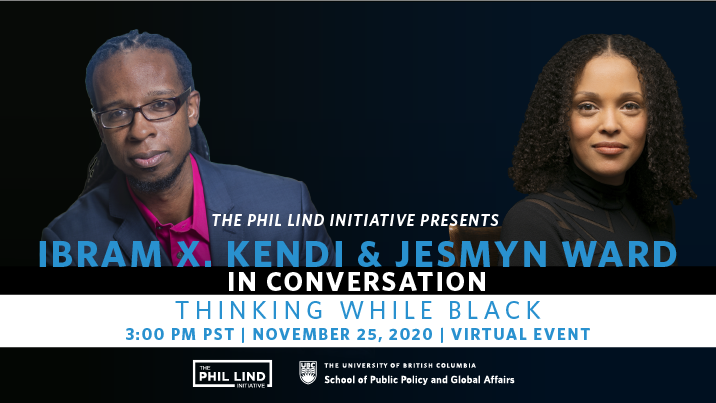

Ibram X. Kendi, National Book award-winning historian and author of How to Be an Antiracist, and Jesmyn Ward, MacArthur Genius and two-time National Book Award winner, were joined in conversation as part of the “Thinking While Black” series. This virtual event was hosted by the Phil Lind Initiative at UBC’s School of Public Policy and Global Affairs.
This event was moderated by Phanuel Antwi, Assistant Professor, Department of English Language and Literatures.
Please Note:A recording of the event was posted here and has now been removed.
Learn more about the 2020 Thinking While Black series here.
Blackness as a form, concept and experience, has fundamentally shaped American iconographies, language, media, and cultural productions. This series invites us to consider Blackness as both a culture and a mode of thinking. This series will meditate on the structures of race in North America and will spotlight the seemingly disconnected forms of racial violence that hide in plain sight. How, despite shifts in rhetoric and political policy, have so many forms of racial violence persisted? How, we ask, can we rethink ourselves by understanding our relations to blackness?
Bio: Ibram X. Kendi is the National Book Award-winning author of Stamped From The Beginning: A Definitive History of Racist Ideas in America and How to Be an Antiracist. His relentless and passionate research puts into question the notion of a post-racial society and opens readers’ and audiences’ eyes to the reality of racism in America today. Kendi’s lectures are sharp, informative, and hopeful, serving as a strong platform for any institution’s discussions on racial discrimination.
When Dr. Ibram X. Kendi won the National Book Award for Nonfiction in 2016 for a book about the history of racist ideas in America, some people felt a disconnect. Emerging from eight years of leadership under an African-American president, a narrative was building in America about the emergence of a post-racial society, colorblind to race and valuing merit over skin color. Kendi challenges this notion in his New York Times-bestselling book Stamped from the Beginning, taking an expansive view on race and racist ideas that spans from 15th century Europe until modern day America. Kendi’s insight on racist structures are the focus of his latest book, How to Be an Antiracist, which empowers readers and audiences to not only recognize the pervasive influence of racism and racist ideas, but to actively participate in dismantling it.Kendi embarked on the research for his book under the assumption that the major producers of racist ideas were hateful and ignorant. And that borne from racist ideas were racist policies like slavery, Jim Crow, and mass incarceration. But as Kendi dug deeper and contextualized motives, he began to gain a new understanding of the cause and effect actually at play. He soon discovered that political, economic, and cultural self-interest are behind the creation of racist policies and these policies in turn create the racist ideas that rationalize the deep inequities in everything from wealth to health.
Bio: MacArthur Genius and two-time National Book Award winner Jesmyn Ward has been hailed as the standout writer of her generation, proving her “fearless and toughly lyrical” voice in novels, memoir, and nonfiction. Betsy Burton of the American Booksellers Association has called her “the new Toni Morrison.” In 2017, she became the first woman and the first person of color to win two National Book Awards for Fiction—joining the ranks of William Faulkner, Saul Bellow, John Cheever, Philip Roth, and John Updike. Ward’s stories are largely set on the Gulf Coast of Mississippi, where she grew up and still lives. When Hurricane Katrina slammed into the Gulf Coast, Ward was forced to evacuate her rapidly flooding home. Her writing is deeply informed by the trauma of Katrina, not to mention its unimaginable social and economic repercussions. Her novel Salvage the Bones, winner of the 2011 National Book Award, is a troubling but ultimately empowering tale of familial bonds set amid the chaos of the hurricane. Likewise, Ward’s debut novel, Where the Line Bleeds, depicts what Publishers Weekly calls “a world full of despair but not devoid of hope” in the aftermath of natural disaster.Ward’s memoir, Men We Reaped, delves into the five years of Ward’s life in which she lost five young men—to drugs, accidents, suicide, and the bad luck that follows poor people and people of color. Lauded by Kirkus Reviews as a “modern rejoinder to Black Like Me [and] Beloved,” Men We Reaped is a beautiful and painful homage to Ward’s ghosts and the haunted yet hopeful place she calls home. Men We Reaped won the Heartland Prize and was a finalist for the National Book Critics Circle Award.Ward is the also the editor of the critically acclaimed anthology The Fire This Time: A New Generation Speaks about Race, which NPR named one of the Best Books of 2016. Taking James Baldwin’s 1963 examination of race in America, The Fire Next Time, as a jumping-off point, this groundbreaking collection features essays and poems about race from the most important voices of our time—including Edwidge Danticat, Natasha Trethewey, Isabel Wilkerson, Mitchell S. Jackson, Kiese Laymon, and Claudia Rankine.
Subscribe to our Phil Lind Initiative Newsletter for updates regarding future Phil Lind Initiative events.
Artwork Credit: Sandra Brewster
Hosted by:



